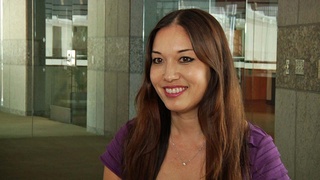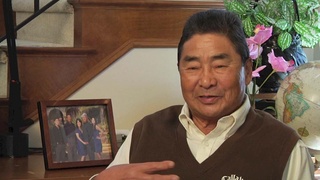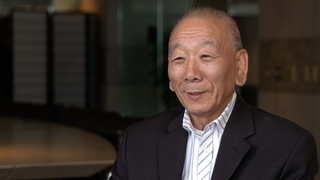Interviews
Working together in Okinawa using three languages
When we were in Okinawa, one thing that I think perfectly describes how confusing it can be to have so many cultures and languages, so we did a canoeing activity where we all had to canoe traditional Okinawan boats. And so we had an instructor at the front and they would be shouting out commands in Japanese. And you needed to follow it so that everyone would go the same direction otherwise your boat would tip over. So you’d shout it out in Japanese and the Japanese kids were sitting in the front with the Peruvian kids. So the Japanese kids would hear it and so with the Japanese Peruvian kids. The Japanese Peruvian kids could actually speak Japanese fluently, a lot of Japanese Peruvians can actually do that too, which is interesting. So the Japanese Peruvian kids would tell me that in Spanish, and then I would translate that Spanish to the American kids behind me who could only speak English. So I think that in itself just kind of tells you how confusing it could be, but also how fun that was just to see…we all have different languages, but we work together just as well. And we made it work. And I think that was one of the funniest moments, just trying to pass these down, these instructions down.
Date: August 30, 2018
Location: California, US
Interviewer: Sharon Yamato
Contributed by: Watase Media Arts Center, Japanese American National Museum
Explore More Videos

Culture is an important part of one's identity
Jewish Japanese American journalist





Conflicted about immigrating to America (Japanese)
(b. 1925) War bride

Defining "Nikkei"
(1941-2018) Japanese Canadian photojournalist and activist

Unique Identity from Having Multiple Backgrounds
(b. 1938) Philipines-born hikiagesha who later migrated to the United States.

Difficulty of spreading authentic sushi (Japanese)
(b. 1949) Sushi chef. Owner of Sushi Gen restaurant in Los Angeles’ Little Tokyo.

Teaching how to eat sushi (Japanese)
(b. 1949) Sushi chef. Owner of Sushi Gen restaurant in Los Angeles’ Little Tokyo.

Growing up Japanese in Hawaii
(b. 1952) Former banking executive, born in Hawaii



Her motto came from her mother
Sansei judge for the Superior Court of Los Angeles County in California

Mother founded Japanese language school in neighbors’ backyard
Sansei judge for the Superior Court of Los Angeles County in California
